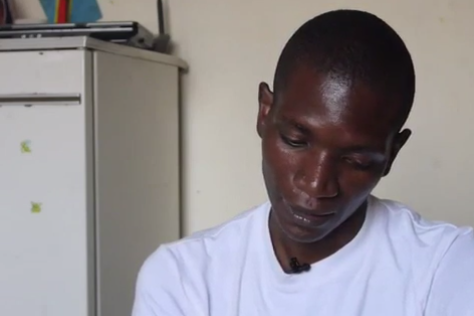Male rape survivor speaks out: We need to talk about what happened to me
Stephen Kigoma says he 'felt undermined', as the only man in his hospital ward being treated for sexual violence

A survivor of male rape in the Democratic Republic of Congo has called for more survivors to come forward about the “taboo”.
Stephen Kigoma was raped during civil conflict in the central African nation but only sought medical help when he fled over the border to Uganda a week later.
"I hid that I was a male rape survivor. I couldn't open up - it's a taboo," he said in a BBC interview.
"As a man, I can't cry. People will tell you that you are a coward, you are weak, you are stupid."
The attack took place when men attacked Mr Kigoma’s home in Beni, a town in the north-east of the country.
"They killed my father. Three men raped me, and they said: 'You are a man, how are you going to say you were raped?'
"It's a weapon they use to make you silent."
Even after fleeing to Uganda in 2011, Mr Kigoma only got help when a physiotherapist treating him for a back problem realised the full extent of his injuries.
He was taken to see a doctor treating survivors of sexual violence, at Mulago Hospital, Uganda’s biggest referral hospital.
He says he was the only man in the ward being treated for sexual violence.
"I felt undermined. I was in a land I didn't belong to, having to explain to the doctor how it happened. That was my fear.”
Mr Kigoma was only one of six men to receive counselling through the Refugee Law Project, a human rights charity in Kampala, Uganda’s capital.
Dr Chris Dolan, head of the organisation, told the BBC about the legal challenges surrounding male rape.
"There's the problem of criminalisation of same-sex activity - it revolves around penetration of the male body, not around consent or lack of consent."
Uganda took in more refugees than any other country in the world last year.
But homosexual acts are illegal within the country, making it more difficult to report rape to the police.
"When I asked the police, they said that if it has anything to do with penetration between a man and a man, it is gay," Mr Kigoma said.
"If it happens to a woman, we listen to them, treat them, care and listen to them - give them a voice. But what happens to men?"
A collaborative study between Dr Chris Dolan and the Institute of Development Studies found that male survivors of conflict-related sexual violence could benefit from “politically conscious collective action,” and speaking out about their experiences.
“At its core, sexual violence ruptures the victims’ understanding of their own gender identity, and of what it means to be ‘men’.
“This rupture results in stigmatisation from the community, silencing and isolating men who have been raped.”
Join our commenting forum
Join thought-provoking conversations, follow other Independent readers and see their replies
Comments
Bookmark popover
Removed from bookmarks